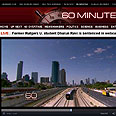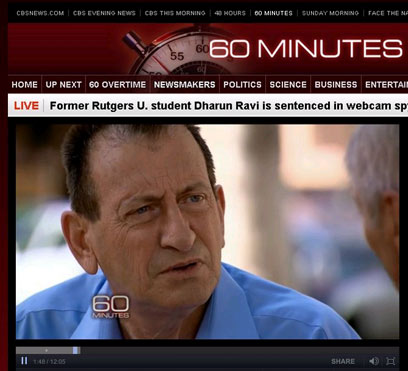
60 Minutes puts spotlight on 'apathetic Tel Aviv bubble'
Profile sheds positive light on coastal city as Island of liberalism in harsh militant Middle East, yet there would also seem to be a great deal of criticism over city's apathy to difficult reality surrounding it
Related articles:
The online version of the item became an instant viral hit among Israeli web surfers - with over 3,000 shares on Facebook. The profile sheds a positive light on Tel Aviv as an Island of liberalism in the harsh militant Middle East, yet there would also seem to be a great deal of criticism over the city's apathy to the difficult reality around it.
- Watch the full CBS 60 Minutes feature Here
The Bob Simon feature presents Tel Aviv as a city "bordered on all sides by danger," a "dynamic city that is becoming renowned worldwide for its booming high-tech industry and lots of great night life." Tel Avivians are described as people who "have learned how not to worry about tomorrow. For them, the only time is now."

Ron Huldai interviewed by Bob Simon
Some notable Israelis were interviewed for the profile, first of which was Tel Aviv Mayor Ron Huldai, who described Tel Aviv as "an island of sanity in this country."
Dancing on Titanic
CBS reporter Bob Simon asks Huldai about dealing with the security situation: "I look behind you pointing to Gaza, there are hundreds of rockets, Katyushas, pointing at Tel Aviv. You look that way, there are thousands of missiles from Hezbollah pointing at Tel Aviv. How do you deal with that?"
Huldai's response: "This is our life. What else we can do? When you go out of your home in New York, you have the chance to get a car accident."
The veteran reporter then mentions the first Gulf War, noting that "Saddam Hussein rained scuds on the city," and "the streets of Tel Aviv became killing zones as Palestinian suicide bombers blew up buses and cars and clubs" yet "the bombings didn't stop Tel Avivians from going to the beach by day and the bars by night."
Talent agent Arik Kneller was among those interviewed for the article. When asked if he ever felt like he was dancing on the Titanic he said: "Sometimes. Sometimes.
"Maybe part of the (reason) people dance on the tables is because they really believe that tomorrow Tel Aviv is going to be attacked. And they really do live as if it's the last day of Pompeii. And they want to grab every second of it," he said.
Simon also mentioned the encouragement received by the late Prime Minister Yitzhak Rabin from Tel Avivians for the peace process with the Palestinians, which he had promoted nearly 20 years ago. He asked Kneller: "People in Tel Aviv were passionately political. They're not anymore. What happened?
"They're tired. Part of it is that they're tired…There's a feeling of stagnation in that sense. There's a feeling that there's not really hope," said Kneller.
Simon also interviewed journalist Gideon Levy, who claimed that there is no real political debate in Israel: "It's all about the next vacation, the next Jeep, the next restaurant. And the good life in Tel Aviv enables you to ignore the real questions."
Levy goes on to say that for Tel Avivians the West Bank could be on another planet even though it is less than an hour away from "the bubble of safety that is Tel Aviv."
Levy said that "Not only do they (Tel Avivians) don't care. They don't want to care. They really want to close their eyes."
Simon does not forget to mention Tel Aviv's economic success. As he shows off the city's tall buildings and full-to-the-brim restaurants, he interviews Yossi Vardi, a businessman and father of one of the developers of the ICQ instant messaging program, noting that Tel Aviv "has more hi tech startup companies than anywhere outside Silicon Valley. It is so far ahead of the curve, you can barely see the end of it."
'Don't ask, Who cares?'
Simon asked Vardi why he thinks Israel has so many startups. Vardi answered: "Well, some people say it's because of the military. Some people say it's because of the universities, the level of education. Some people say it's because of the level of technology.
"I say it's a cultural phenomena and the secret source behind it is the Jewish mother. Every startup kid here has a Jewish mother which drive him crazy, which will push them and challenge them and inspire them."
In order to demonstrate Tel Aviv's party town status, Simon noted that Lonely Planet, "that hip travel magazine, has voted Tel Aviv the third hottest city in the world, complete with cops patrolling on roller skates and city officials giving interviews in places where American politicians wouldn't dare to be seen."
Tel Aviv's standing as a gay-friendly city was also mentioned: "People seem to get along. Religious and secular, soldiers and civilians, straights and gays," says Simon adding that the city was voted the best gay destination in the world.
Actress Noa Tishby was interviewed to discuss the issue: "It's such a non-issue in Israel. That's the thing, being straight, or being gay is a complete non-issue. I mean gays in the military, what's the problem?" Leading Simon to note: "Here it's not "Don't ask, Don't tell." It's 'Don't ask, Who cares?'"
Simon also interviewed gay activist and newspaper columnist Gal Uchovsky, asking him why he believed parents were relatively more tolerant to their sons and daughters coming out of the closet. Uchovsky said he believed living in a war zone may have had something to do with it.
"Here it's a little different…Israel is a war zone. It's been a war zone for many years. It's very hard to raise a child here. They can die in the army.
"They can die in a suicide bombing. So the whole feeling of an Israeli parents is that it's-- it's a big war to keep your kid alive 'til 21. So if at 22 you come-- or any age, he comes and says, "Okay, I'm gay," you know, it's not that bad," Uchovsky claimed.
- Receive Ynetnews updates directly to your desktop










